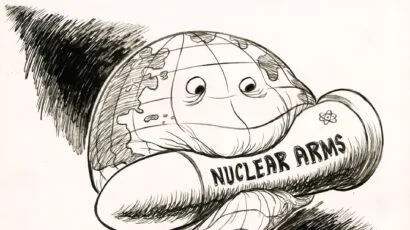Memo to Trump: Create sensible AI policies that focus on real—not speculative—concerns
By Walter Scheirer | January 17, 2025

Editor’s note: This is part of a package of memos to the president.
MEMORANDUM FOR THE PRESIDENT
FROM: WALTER J. SCHEIRER, UNIVERSITY OF NOTRE DAME
PURPOSE: SENSIBLE AI POLICIES THAT ADDRESS REAL PROBLEMS INSTEAD OF CONCERNS ABOUT A SUPERINTELLIGENCE THAT MAY NEVER EXIST.
The new administration has an opportunity to reset the policy conversation around AI governance—a pressing need in the face of a transformative technology that is rapidly reshaping significant aspects of society. With its traditional strengths in semiconductor design, academic and corporate research and development, and commercial innovation, America is leading the world in the creation and deployment of AI technologies. That means the United States has reaped the initial rewards, while experiencing some associated problems. A sensible policy must address those problems without inhibiting the country’s dominant position in this space and avoid placing attention on speculative concerns that are an unnecessary diversion.
The Biden Administration’s executive order on AI stopped short of preventing research to continue on the most powerful classes of machine learning-based algorithms by merely requiring that information about them be shared with the government. It would be a mistake to make unwarranted moves in the opposite direction, especially if they are based on flimsy motivations.
A few vocal constituencies—large tech companies, elite computer scientists, and political activists—have made claims regarding the emergence of “superintelligence” as an existential risk to humanity, and those claims often dominate public debate. But such claims are not grounded in the reality of today’s generative AI, which, while impressive in many regards, still struggles with basic tasks. Going down the sci-fi tinged path of AI as an existential risk will, at best, be a distraction from the real trouble that the country currently faces.
There are several clear and present dangers that should be a priority of the new administration:
- The appalling spread of AI-generated deepfake pornography in middle and high schools, targeting students, particularly young women. A patchwork of state laws is emerging to treat such material as child pornography, but the broader problem—widespread availability of nude images of minors and algorithms that use them as training data—persists. This technology serves no useful purpose, and the data on which it is trained are illegal. Federal regulations should be developed to take it off the internet.
- The rise of AI-driven scams that extract money, particularly from the elderly, through the impersonation of friends and family or sell worthless cryptocurrency through the propagation of synthetic content. Telecoms and content providers should be legally compelled to take swift action against scammers, and they should be encouraged to seek technological mitigations that block AI scams.
- AI-enabled smart cameras now present everywhere from street corners to gates at the airport. The administration should adopt sensible policies around these new surveillance technologies. Pervasive dragnets and predictive policing do not work, but law enforcement should be able to respond to real crimes when they occur using AI tools that do. Further, there is a need to address biometric privacy when cameras are used to identify people. The administration should mandate technological solutions to enhance privacy whenever the government uses face-recognition technology.
The opportunities presented by AI must not be forgotten despite the problems it poses. AI has the potential to contribute positively to healthcare, education, manufacturing, and a host of other sectors of the economy. It’s also possible that it will create more jobs than it displaces in the process. But more research and development is necessary to realize these gains.
There is tension between progress in AI R&D and the administration’s laudable goal of reining in government spending. Reforms are sorely needed in the scientific funding space, but any changes in federal support for science should cut needless bureaucracy that slows science—and double down on direct funding to universities, national laboratories, and small businesses working on AI R&D. Finally, the establishment of a President’s Council on AI that would take a multidisciplinary approach (ideally untainted by corporate interest) to assessing the pros and cons of emerging technologies could aid the federal government in better guiding Americans into a future in which society and AI thrive.
Together, we make the world safer.
The Bulletin elevates expert voices above the noise. But as an independent nonprofit organization, our operations depend on the support of readers like you. Help us continue to deliver quality journalism that holds leaders accountable. Your support of our work at any level is important. In return, we promise our coverage will be understandable, influential, vigilant, solution-oriented, and fair-minded. Together we can make a difference.
Keywords: AGI, Trump, artificial intelligence, generative AI, policy, superintelligence, technology
Topics: Disruptive Technologies















